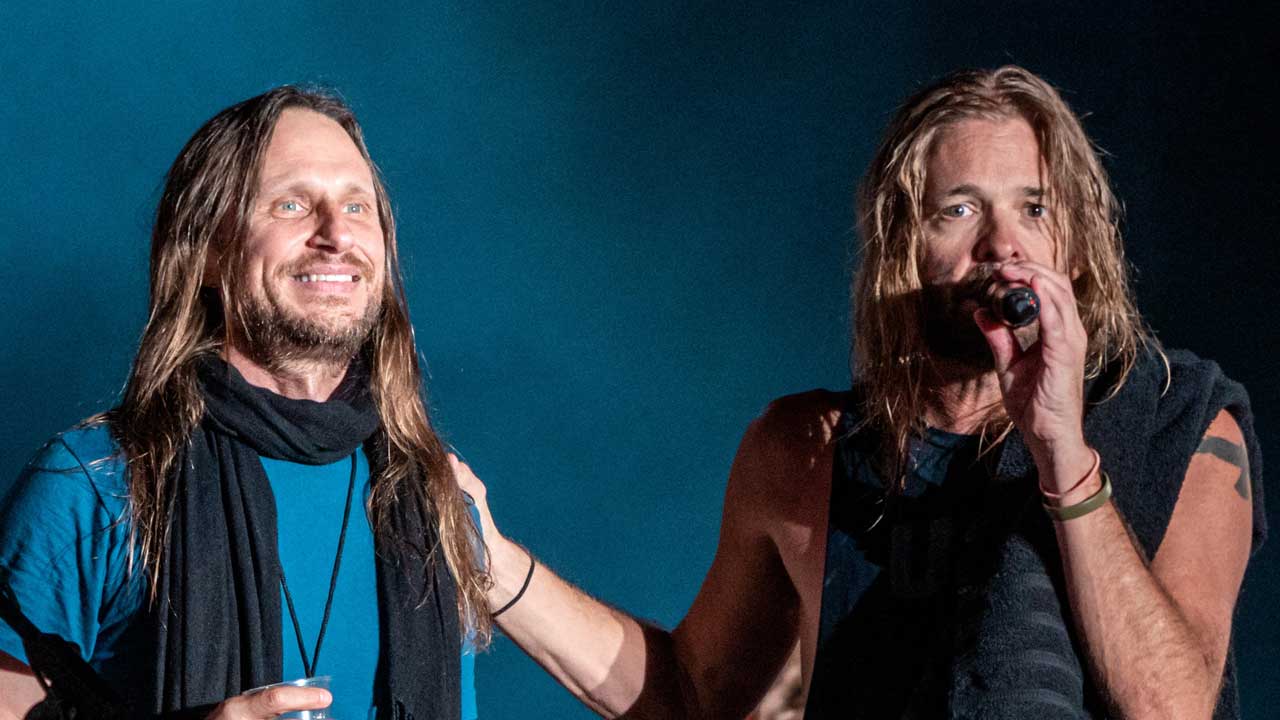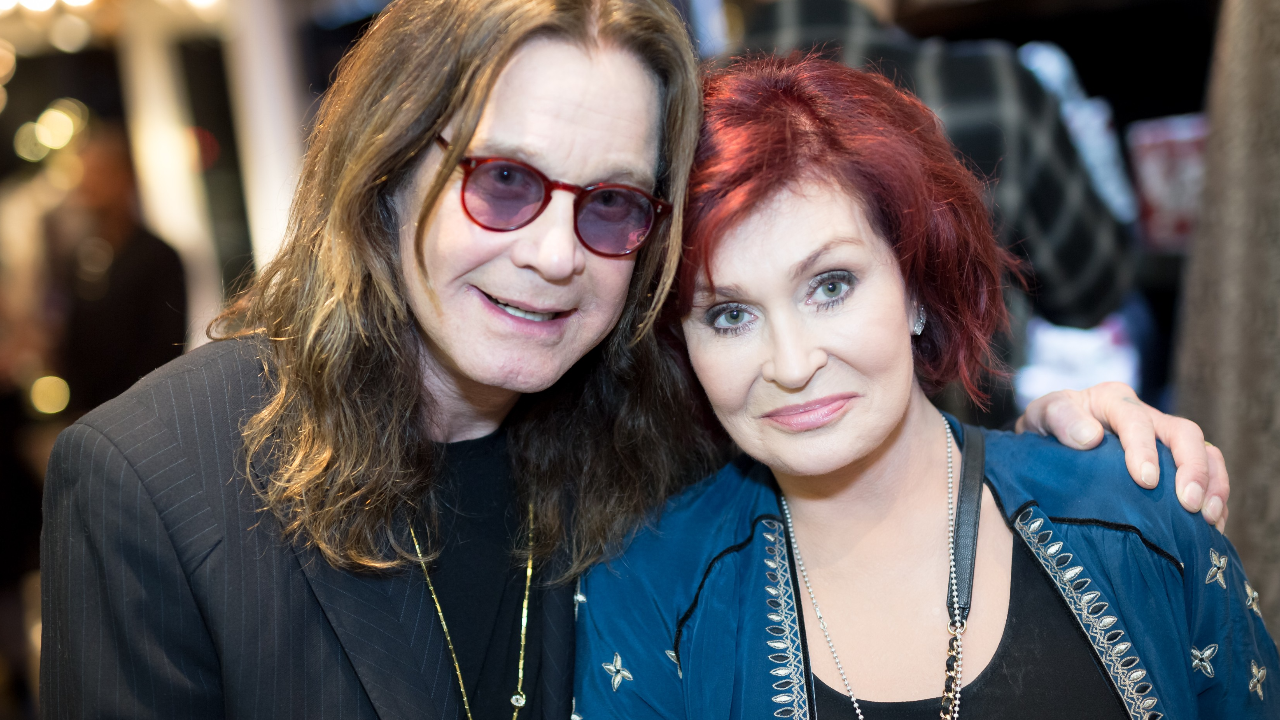Yes frontman Jon Davison: "Taylor Hawkins’ last words to me were ‘I love you’"
“He was fearless”: Yes frontman Jon Davison on his childhood friend Taylor Hawkins

Few people knew Taylor Hawkins as well as Jon Davison. The pair met as young kids in Laguna Beach, California in the early 80s, and it was there – in the drummer’s parents’ garage – that they embarked on their musical journey together.
That shared journey would eventually diverge, with Hawkins joining blues rocker Sass Jordan, Alanis Morissette and ultimately the Foo Fighters, while his old friend eventually joined prog icons Yes as their singer, where he remains today. But throughout it all the two men never lost touch, speaking regularly and getting together to jam whenever they could.
In the wake of Hawkins’ death in March this year, Davison spoke to Classic Rock as part of a tribute to the drummer. From nerding out over Star Wars and hero-worshipping Queen to the last conversation they had, this is the story of their lifelong friendship.

Where did you first meet Taylor?
Taylor and I first met when he moved into my neighbourhood in Laguna Beach, California around, I guess, 1981. I was 10 and he was nine.
What was the nine-year-old Taylor Hawkins like?
I remember he was so grateful and happy just to have a friend that lived down the street. We quickly became glued at the hip. Like most boys of our generation, we were obsessed with Star Wars. My early memories are dressing up and being Star Wars nerds and playing out scenes from the films.
Sign up below to get the latest from Classic Rock, plus exclusive special offers, direct to your inbox!
Where did music come in for the two of you?
Like I said, we met in 1981 and that was when we were really into the Star Wars thing. Then by 1982, all that went out the window and music was the new passion. I can clearly remember the moment Taylor called me expressing his excitement at discovering this band Queen and their record The Game.
"I can remember it so distinctly. He was very much taken by their drummer, Roger Taylor. Taylor would go on about how he admired him because he wasn’t just a drummer, he was a singing, songwriting drummer. It’s funny, Taylor actually looked like a little mini-Roger Taylor at that age too.
When did Taylor start drumming?
It wasn’t long after that. He convinced his parents to buy him a drum set. So he was probably 10 or 11 at most when he started playing drums. He was completely in his element. He had his role model in Roger Taylor, and he had found his passion, one that gave him a sense of purpose and confidence.
You started playing guitar and bass around the same time. Did you encourage each other musically?
We really did. We learned our instruments together. That confidence he had, I had too, and it helped propel us into the next phase of youth. We were aspiring musicians and best friends going through all the rites of passages together. Those coming-of-age experiences you have as teenagers and young men, we were there side by side through it all.
What’s your favourite memory of Taylor back then?
Just being on summer vacation and going down to the beach for the first part of the day and talking about music and getting excited. Then we'd go up to his house and play music - his parents let us use their garage for our practice space.
What was your first band together?
We had a lot of high school bands. We were mostly a cover band - we’d play dances and parties, talent shows, that kind of thing. Taylor loved Stewart Copeland from The Police, so we’d do Police covers. Later, Stewart befriended Taylor, which was a real big thing for him.
Was there a point where you realised your friend was a really great drummer?
That was a little later. Eventually we discovered Rush, and Neil Peart was a major inspiration. That was our introduction to progressive rock and playing more intricate styles, and that’s when he really took off as a drummer.
Were you both ambitious?
Yeah. There was a lot of parental pressure to go to college, but Taylor and I were both waiting and watching for any musical opportunity to lead us away from that. We were in a band together called Sylvia, which came about through our mutual friend Riz Story, who was a songwriter and a visionary in a way. That was our first original band.
But our paths sort of separated. I went off to Seattle to go to audio and video school, and I ended up joining a popular local band up there called Sky Cries Mary. Of course, Taylor stayed in LA and eventually landed the gig with Alanis Morissette, which was a huge deal. And of course, it was through playing festivals with Alanis that he came into the company of Dave Grohl and the rest of the Foo Fighters.
Was there a bit of bragging on his part when he joined the Foos?
There was some funny bragging, but we were so close that I took it in the right spirit. I think he was a little bit frustrated before that, because it wasn’t really his dream, but when he met Dave, it felt like he found another brother. They had a bond and an energy and enthusiasm that they shared. They really did build that band together. As great as all of the musicians are in the Foo Fighters, it really revolved around Dave and Taylor and their energy.
Did you carry on playing with Taylor throughout that time?
Through all the phases of our career, we were always doing something together. We recorded a lot of odds and ends. There’s some Coattail Riders stuff that's unreleased that I've played bass on and sing vocals on. We did some stuff with [late Yes bassist] Chris Squire, cos Taylor was friends with him even before I joined the band.
What did you do with Chris Squire?
It was really just a jam. We never did vocals, but we did record it. I’d like to approach the rest of the guys in Yes and see about finishing it off. I’d love to bring that music to life and share it with the public. I hope it will come out in some form one day, as a tribute to Taylor and to Chris.
Taylor was instrumental in helping me get the gig with Yes. I’d decided to pursue lead vocals, and me was really supportive of me doing that. He pushed Chris to take a listen to what I was doing when they needed a new singer. It’s been 10 years now, and I’m eternally grateful to Taylor for being so instrumental in that. He helped give me a second chance at a musical career after I thought it was all behind me.
You were both pretty busy with your respective careers. Did you have many opportunities to get together and just hang out?
I returned to California after Seattle, and we spent more together, and then I moved to Texas and went off on my own adventures. I fell in love with an amazing girl named Emily Lodge [the daughter of John Lodge of the Moody Blues] and I’ve been living in England with her for the last years, so I hadn’t seen Taylor face to face since 2019. When the Foo Fighters played in Dublin, we went over there to watch. They actually invited up to sing Under Pressure with Taylor, totally spur of the moment, in front of 45,000 people. That was pretty nerve-wracking.
But he and I stayed very close through it all. We would call each other and speak at least once a week, just to touch base and wish each other well with our adventures. I felt like Taylor genuinely wanted me to be as happy and fulfilled musically as he was. He was always very loyal to the fact that we’d grown up together.
Can you remember the last time you spoke to him?
It was maybe 10 days ago [the interview took place shortly after Hawkins’ death]. We spoke just before he went to South America. I was finishing a tour with John Lodge, and he was really excited about me doing that. He wished me well with that.
As someone who knew Taylor for so long, how would you sum him up?
Fearless. He was fearless when it came to backing up Dave Grohl, who was the drummer of his generation - and he pulled it off. And he wanted to be more than a drummer. He wanted to play guitar and sing and writers songs. He was such a musicologist – he knew every fact and figure about every musician and album. It was amazing, and I think it constantly fed him with inspiration.
Like I said, he called me at least once a week from wherever he was in the world, regardless of how busy he was. He was in one of the biggest and most revered and respected bands in the world, and I think he found solace in speaking to me. I got a sense that I was kind of anchor - that our friendship was a symbol of simpler times, and something constant in his turbulent world. I’m grateful that I was able to be that friend for him.
We always finished our lengthy conversations by each saying to each other, “I love you.” And those were his last words to me: “I love you.” I can't really ask for anything more, all things considered.
Dave Everley has been writing about and occasionally humming along to music since the early 90s. During that time, he has been Deputy Editor on Kerrang! and Classic Rock, Associate Editor on Q magazine and staff writer/tea boy on Raw, not necessarily in that order. He has written for Metal Hammer, Louder, Prog, the Observer, Select, Mojo, the Evening Standard and the totally legendary Ultrakill. He is still waiting for Billy Gibbons to send him a bottle of hot sauce he was promised several years ago.

